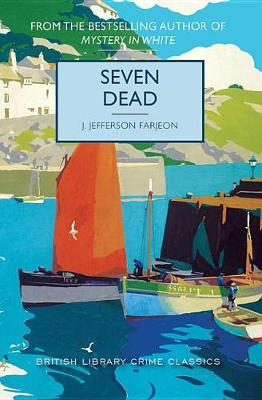Reviewed by brokentune on
Oh I wish we had more of J. Jefferson Farjeon's books widely available to us, but alas I only have one more of his books to look forward to (The Z Murders) - unless I want to give the Ben, the Tramp series another shot.
Seven Dead was a curious book. It didn't start out like the usual Golden Age mystery. There was little that was twee about the start of the book (and even less about the ending!), we didn't get to meet any characters that we can fully trust (apart from the police), we get snippets of facts that seem to be pieces of a horrible puzzle, but each turn of event just put a question mark on the suppositions made in the previous chapter.
The only guide through all this is Detective Inspector Kendall, whose no-nonsense approach is lauded in mockery.
“You mentioned your name. There are plenty of Kendalls in the world, but I remember one who did pretty good work recently at Bragley Court, in the case of the Thirteen Guests. What I liked about him was that he didn’t play the violin, or have a wooden leg, or anything of that sort. He just got on with it.”
Fear not: Kendall gives as good as he gets.
So, there is a fun undertone to the story, some flippancy, some snark, but this really is only light relief from the tense atmosphere that Farjeons sets up for us - especially whenever we are near the scene of the crime, the ironically-named Haven House:
“Hey! What’s that?” jerked the sergeant. Something was happening in the house. As they darted towards it, an unearthly noise issued from the hall, and the sergeant admitted afterwards that it “fair went up his spine.” The sound grew venomously. It was like a hive of bees that had gone mad. There seemed no rhyme or reason in it, unless it had been designed as a macabre overture to what was to follow.
The light touch, the mockery, and the jokes are still not enough to lift the story into the realms of a cozy mystery. The underlying plot - even tho we do not find out until the end what actually happened - is entirely sinister and just plain horrible.
"There’s some mighty queer story behind all this, and maybe, when we’ve unearthed it—as we’re going to—suicide will fit the climax. But I’m not going to accept that theory until it’s explained to me how they got into the house, why they nailed up the shutters, why they stuffed two weeks’ papers up the chimney, how they destroyed themselves—that’s your job, doctor, and it’s going to mean Westminster Abbey or professional extinction for you!—who used the revolver, why he or she shot a picture in another room, where the Fenners are, why they left in a hurry, and how the devil—here’s another little tit-bit I’ve just had from the station, Mr. Hazeldean—how the devil these seven people, before settling down to their final job, locked themselves in the drawing-room with the key on the outside.”
Farjeon wasn't writing in the horror genre but there was something about the three books that I have read by him that makes me think he could have been at home in it. The atmosphere of his settings, and the suspense in his plots are well-crafted and reminded me of some of the Gothic tales written by late Victorian authors. I'd also wager that he may have been influenced by the writing of Arthur Conan Doyle, not just the Holmes stories, though I was somewhat reminded of them when reading the conclusion of Seven Dead (not a spoiler or a clue, btw.).
Btw, this story also had another one of Farjeon's delightful romances in it, which is improved only by the fact that I couldn't figure out until the end if any of the characters were trustworthy:
“Good-evening, Miss Fenner.”
She almost dropped her book. The brown eyes were on his again, bright with both astonishment and alarm. He discovered within himself an intense desire to dispel the latter, and dreaded the moment ahead when he would have to introduce a far greater alarm than any she could now be feeling.
“I’m quite harmless,” he smiled.
“Who are you?” she asked. “I don’t know you. Do I?”
“No.”
Reading updates
- Started reading
- 29 December, 2018: Finished reading
- 29 December, 2018: Reviewed
